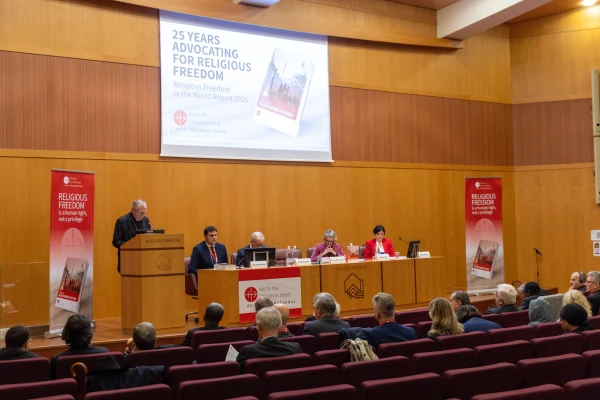For the first time, Mexico appears in the Religious Freedom in the World 2025 report by Aid to the Church in Suffering (ACN), a document that warns about the growing vulnerability of religious communities in various regions of the planet. “Organized crime acts as an agent of persecution in areas where the State is weak or has lost control,” reads the document presented on Tuesday.
According to Marcela Szymanski, ACN religious freedom expert, the work of the Church to provide hope and social assistance becomes an indirect target of criminal groups. “The Church, with its duty to provide opportunities and comfort to a population that is suffering poverty and insecurity, is offering courses, employment opportunities, opening shelters for battered women, creating shelters for migrants. But, without knowing it, they are touching the economic interests of the lords of organized crime,” he points out in statements to ACI Prensa.
Receive the main news from ACI Prensa by WhatsApp and Telegram
It is increasingly difficult to see Catholic news on social media. Subscribe to our free channels today:
According to Szymanski, these aid actions represent a significant economic loss for cartels, which traditionally exploit women for prostitution or charge migrants thousands of dollars to illegally cross the border into the United States.

“In 2024, there were 2.1 million migrants intercepted at the land border alone. If half of them did not pay a thousand dollars to the cartels, we are talking about a billion dollars that the criminals stopped receiving. That is why it is a target. It is stealing the ‘clientele’ from organized crime and that is why they kill them,” he explained.
They kill the priests of the mountains before the police arrive
The danger for religious leaders is real and palpable. Szymanski describes extreme cases of violence against priests and activists: “They go and kill the father who organizes classes for the poor, there in the mountains. The priests are completely defenseless.” Even the precautionary measures imposed by international organizations are insufficient in the face of local violence.
“In the Organization of American States, through the Inter-American Court of Human Rights, precautionary measures are imposed to protect a threatened priest, like a watch with an emergency button. But if they are in the mountains, they are killed before the police arrive,” he says.
The expert gives a concrete example: on October 24 of last year, Father Marcelo Pérez was murdered in a popular neighborhood of San Cristóbal de las Casas, in Chiapas, in southern Mexico. He had dedicated his priestly life to helping indigenous communities and raising his voice against the chiefs and the violence of the powerful.
“He was wearing one of those watches, Szymanski says, but when help arrived, he was already dead.” “It is urgent that these measures are more serious, because they are inappropriate to the level of danger that these servers face,” he claims.
Six bishops who tried to mediate were kidnapped
The ACN report highlights the need to make visible the violence faced by religious communities in Mexico and to reinforce effective protection mechanisms. “The Church fulfills its mission by offering comfort and hope, but the servants of these communities pay a high price in regions where the State cannot guarantee security. It is a phenomenon that demands international attention,” says Szymanski.
The situation worsens in territories dominated by particularly violent cartels, such as the Jalisco Nueva Generación Cartel. “Six bishops tried to mediate between the groups so that they would stop fighting over the territory, but they were kidnapped. It is a super difficult situation, but we have to move forward little by little.”
In any case, technology can be a great ally if used well. The expert assures that some priests have started using applications such as Eyewitness Atrocity to document the facts: “They take a photo, it is sent and it disappears from the phone. That is, they allow reporting without needing to accuse anyone, but they leave an invaluable record,” explains Szymanski.
The expert emphasizes that collaboration between dioceses, Catholic movements and local communities is crucial to protect religious servants: “We have to unite. Four, five bishops, four dioceses, three Catholic movements, three Church movements. We are going to do this. Although it may seem small, it is what allows us to build protection and evidence against violence.”
Authoritarian drift in Mexico
Furthermore, ACN’s religious freedom expert warns of the authoritarian drift in the country that “directly impacts religious freedom.” The lack of autonomy of fundamental institutions undermines democracy, he explained, and, therefore, religious freedom.
“In Mexico they eliminated the judicial system as of September 1; now it is part of the Executive. An empire has been formed that no one saw. Everyone continues to believe that it is a kind of democracy because there is an election, but the problems we have are the lack of awareness,” said Szymanski.
The expert warned that, while the Catholic Church focuses on providing hope and opportunity, it ignores the fact that many citizens face widespread violence and poverty. “If they joined together they could offer joint solutions, but the autocrats are gradually destroying all instances of verification and corroboration,” he added.
Among the examples cited by Szymanski are the Energy Price Verification Agency, eliminated and now without control over prices, and the National Competition Agency, which no longer regulates possible monopolies. Added to this is the concentration of power in a single political party and the paralysis of the National Electoral Institute, now with barely 20% of its budget, which compromises the possibility of credible elections.
The expert also denounces that religious leaders and the media face censorship, unpayable fines or even prison for criticizing the Government. “Meanwhile, the resources and courts you could go to disappear,” he concluded.

